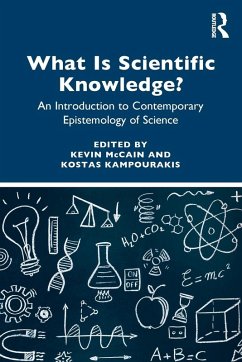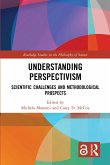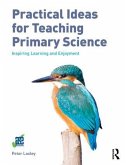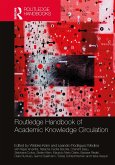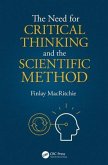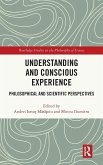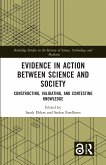What is Scientific Knowledge?
An Introduction to Contemporary Epistemology of Science
Herausgeber: McCain, Kevin; Kampourakis, Kostas
What is Scientific Knowledge?
An Introduction to Contemporary Epistemology of Science
Herausgeber: McCain, Kevin; Kampourakis, Kostas
- Broschiertes Buch
- Merkliste
- Auf die Merkliste
- Bewerten Bewerten
- Teilen
- Produkt teilen
- Produkterinnerung
- Produkterinnerung
What is Scientific Knowledge? is a much-needed collection of introductory-level chapters on the epistemology of science.
Andere Kunden interessierten sich auch für
![New Philosophical Perspectives on Scientific Progress New Philosophical Perspectives on Scientific Progress]() New Philosophical Perspectives on Scientific Progress67,99 €
New Philosophical Perspectives on Scientific Progress67,99 €![Understanding Perspectivism Understanding Perspectivism]() Understanding Perspectivism44,99 €
Understanding Perspectivism44,99 €![Practical Ideas for Teaching Primary Science Practical Ideas for Teaching Primary Science]() Peter LoxleyPractical Ideas for Teaching Primary Science45,99 €
Peter LoxleyPractical Ideas for Teaching Primary Science45,99 €![Routledge Handbook of Academic Knowledge Circulation Routledge Handbook of Academic Knowledge Circulation]() Routledge Handbook of Academic Knowledge Circulation253,99 €
Routledge Handbook of Academic Knowledge Circulation253,99 €![The Need for Critical Thinking and the Scientific Method The Need for Critical Thinking and the Scientific Method]() Finlay MacRitchieThe Need for Critical Thinking and the Scientific Method49,99 €
Finlay MacRitchieThe Need for Critical Thinking and the Scientific Method49,99 €![Understanding and Conscious Experience Understanding and Conscious Experience]() Understanding and Conscious Experience164,99 €
Understanding and Conscious Experience164,99 €![Evidence in Action between Science and Society Evidence in Action between Science and Society]() Evidence in Action between Science and Society44,99 €
Evidence in Action between Science and Society44,99 €-
-
-
What is Scientific Knowledge? is a much-needed collection of introductory-level chapters on the epistemology of science.
Hinweis: Dieser Artikel kann nur an eine deutsche Lieferadresse ausgeliefert werden.
Hinweis: Dieser Artikel kann nur an eine deutsche Lieferadresse ausgeliefert werden.
Produktdetails
- Produktdetails
- Verlag: Taylor & Francis Ltd
- Seitenzahl: 330
- Erscheinungstermin: 24. Juni 2019
- Englisch
- Abmessung: 229mm x 152mm x 18mm
- Gewicht: 486g
- ISBN-13: 9781138570153
- ISBN-10: 113857015X
- Artikelnr.: 57111872
- Herstellerkennzeichnung
- Libri GmbH
- Europaallee 1
- 36244 Bad Hersfeld
- gpsr@libri.de
- Verlag: Taylor & Francis Ltd
- Seitenzahl: 330
- Erscheinungstermin: 24. Juni 2019
- Englisch
- Abmessung: 229mm x 152mm x 18mm
- Gewicht: 486g
- ISBN-13: 9781138570153
- ISBN-10: 113857015X
- Artikelnr.: 57111872
- Herstellerkennzeichnung
- Libri GmbH
- Europaallee 1
- 36244 Bad Hersfeld
- gpsr@libri.de
Kevin McCain is Associate Professor of Philosophy at the University of Alabama at Birmingham, USA. His published research includes Evidentialism and Epistemic Justification (2014), The Nature of Scientific Knowledge: An Explanatory Approach (2016), and, with Kostas Kampourakis, Uncertainty: How It Makes Science Advance (2019). Kostas Kampourakis is a researcher in science education and a lecturer at the University of Geneva, Switzerland. His most recent authored books are Making Sense of Genes (2017), Turning Points: How Critical Events Have Driven Human Evolution, Life and Development (2018), and, with Kevin McCain, Uncertainty: How It Makes Science Advance (2019). He has also co-edited, with Michael Reiss, Teaching Biology in Schools: Global Research, Issues and Trends (2018).
Preface Part I: How is scientific knowledge generated? 1. How many
scientists does it take to have knowledge? Jeroen de Ridder 2. What
attitude should scientists have? Good academic practice as a precondition
for the production of knowledge Thomas A. C. Reydon 3. How do medical
researchers make causal inferences? Olaf Dammann, Ted Poston, and Paul
Thagard 4. How do explanations lead to scientific knowledge? Kevin McCain
5. What is scientific understanding and how can it be achieved? Henk W. de
Regt and Christoph Baumberger Part II: What is the nature of scientific
knowledge? 6. What are scientific concepts? Theodore Arabatzis 7. How can
we tell science from pseudoscience? Stephen Law 8. How do we know that
2+2=4? Carrie S. I. Jenkins 9. Is scientific knowledge special? Plus ça
change, plus c'est la même chose Richard Fumerton 10. Can scientific
knowledge by measured by numbers? Hanne Andersen Part III: Does bias affect
our access to scientific knowledge? 11. Why do logically incompatible
beliefs seem psychologically compatible? Science, pseudoscience, religion,
and superstition Andrew Shtulman and Andrew Young 12. Do our intuitions
mislead us? The role of human bias in scientific inquiry Susan A. Gelman
and Kristan A. Marchak 13. Can scientific knowledge sift the wheat from the
tares? A brief history of bias (and fears about bias) in science Erik L.
Peterson 14. What grounds do we have for the validity of scientific
findings? The new worries about science Janet A. Kourany 15. Is science
really value free and objective? From objectivity to scientific integrity
Matthew J. Brown Part IV: Is scientific knowledge limited? 16. Should we
trust what our scientific theories say? Martin Curd and Dana Tulodziecki
17. What are the limits of scientific explanation? Sara Gottlieb and Tania
Lombrozo 18. Should we accept scientism? The argument from self-referential
incoherence Rik Peels 19. How are the uncertainties in scientific knowledge
represented in the public sphere? The genetics of intelligence as a case
study Kostas Kampourakis. Index
scientists does it take to have knowledge? Jeroen de Ridder 2. What
attitude should scientists have? Good academic practice as a precondition
for the production of knowledge Thomas A. C. Reydon 3. How do medical
researchers make causal inferences? Olaf Dammann, Ted Poston, and Paul
Thagard 4. How do explanations lead to scientific knowledge? Kevin McCain
5. What is scientific understanding and how can it be achieved? Henk W. de
Regt and Christoph Baumberger Part II: What is the nature of scientific
knowledge? 6. What are scientific concepts? Theodore Arabatzis 7. How can
we tell science from pseudoscience? Stephen Law 8. How do we know that
2+2=4? Carrie S. I. Jenkins 9. Is scientific knowledge special? Plus ça
change, plus c'est la même chose Richard Fumerton 10. Can scientific
knowledge by measured by numbers? Hanne Andersen Part III: Does bias affect
our access to scientific knowledge? 11. Why do logically incompatible
beliefs seem psychologically compatible? Science, pseudoscience, religion,
and superstition Andrew Shtulman and Andrew Young 12. Do our intuitions
mislead us? The role of human bias in scientific inquiry Susan A. Gelman
and Kristan A. Marchak 13. Can scientific knowledge sift the wheat from the
tares? A brief history of bias (and fears about bias) in science Erik L.
Peterson 14. What grounds do we have for the validity of scientific
findings? The new worries about science Janet A. Kourany 15. Is science
really value free and objective? From objectivity to scientific integrity
Matthew J. Brown Part IV: Is scientific knowledge limited? 16. Should we
trust what our scientific theories say? Martin Curd and Dana Tulodziecki
17. What are the limits of scientific explanation? Sara Gottlieb and Tania
Lombrozo 18. Should we accept scientism? The argument from self-referential
incoherence Rik Peels 19. How are the uncertainties in scientific knowledge
represented in the public sphere? The genetics of intelligence as a case
study Kostas Kampourakis. Index
Preface Part I: How is scientific knowledge generated? 1. How many
scientists does it take to have knowledge? Jeroen de Ridder 2. What
attitude should scientists have? Good academic practice as a precondition
for the production of knowledge Thomas A. C. Reydon 3. How do medical
researchers make causal inferences? Olaf Dammann, Ted Poston, and Paul
Thagard 4. How do explanations lead to scientific knowledge? Kevin McCain
5. What is scientific understanding and how can it be achieved? Henk W. de
Regt and Christoph Baumberger Part II: What is the nature of scientific
knowledge? 6. What are scientific concepts? Theodore Arabatzis 7. How can
we tell science from pseudoscience? Stephen Law 8. How do we know that
2+2=4? Carrie S. I. Jenkins 9. Is scientific knowledge special? Plus ça
change, plus c'est la même chose Richard Fumerton 10. Can scientific
knowledge by measured by numbers? Hanne Andersen Part III: Does bias affect
our access to scientific knowledge? 11. Why do logically incompatible
beliefs seem psychologically compatible? Science, pseudoscience, religion,
and superstition Andrew Shtulman and Andrew Young 12. Do our intuitions
mislead us? The role of human bias in scientific inquiry Susan A. Gelman
and Kristan A. Marchak 13. Can scientific knowledge sift the wheat from the
tares? A brief history of bias (and fears about bias) in science Erik L.
Peterson 14. What grounds do we have for the validity of scientific
findings? The new worries about science Janet A. Kourany 15. Is science
really value free and objective? From objectivity to scientific integrity
Matthew J. Brown Part IV: Is scientific knowledge limited? 16. Should we
trust what our scientific theories say? Martin Curd and Dana Tulodziecki
17. What are the limits of scientific explanation? Sara Gottlieb and Tania
Lombrozo 18. Should we accept scientism? The argument from self-referential
incoherence Rik Peels 19. How are the uncertainties in scientific knowledge
represented in the public sphere? The genetics of intelligence as a case
study Kostas Kampourakis. Index
scientists does it take to have knowledge? Jeroen de Ridder 2. What
attitude should scientists have? Good academic practice as a precondition
for the production of knowledge Thomas A. C. Reydon 3. How do medical
researchers make causal inferences? Olaf Dammann, Ted Poston, and Paul
Thagard 4. How do explanations lead to scientific knowledge? Kevin McCain
5. What is scientific understanding and how can it be achieved? Henk W. de
Regt and Christoph Baumberger Part II: What is the nature of scientific
knowledge? 6. What are scientific concepts? Theodore Arabatzis 7. How can
we tell science from pseudoscience? Stephen Law 8. How do we know that
2+2=4? Carrie S. I. Jenkins 9. Is scientific knowledge special? Plus ça
change, plus c'est la même chose Richard Fumerton 10. Can scientific
knowledge by measured by numbers? Hanne Andersen Part III: Does bias affect
our access to scientific knowledge? 11. Why do logically incompatible
beliefs seem psychologically compatible? Science, pseudoscience, religion,
and superstition Andrew Shtulman and Andrew Young 12. Do our intuitions
mislead us? The role of human bias in scientific inquiry Susan A. Gelman
and Kristan A. Marchak 13. Can scientific knowledge sift the wheat from the
tares? A brief history of bias (and fears about bias) in science Erik L.
Peterson 14. What grounds do we have for the validity of scientific
findings? The new worries about science Janet A. Kourany 15. Is science
really value free and objective? From objectivity to scientific integrity
Matthew J. Brown Part IV: Is scientific knowledge limited? 16. Should we
trust what our scientific theories say? Martin Curd and Dana Tulodziecki
17. What are the limits of scientific explanation? Sara Gottlieb and Tania
Lombrozo 18. Should we accept scientism? The argument from self-referential
incoherence Rik Peels 19. How are the uncertainties in scientific knowledge
represented in the public sphere? The genetics of intelligence as a case
study Kostas Kampourakis. Index

